In recent years, off-grid living has become popular for many, offering a unique blend of independence, sustainability, and harmony with nature. Particularly, the idea of off-grid living in mobile homes presents an attractive option for those looking to break free from the conventional constraints of home ownership. This lifestyle emphasizes the importance of sustainable practices and the use of alternative energy sources.
At Mobile Home Land of Texas, a subsidiary of Lonestar Land Sales, we specialize in helping individuals and families make this dream a reality. With over two decades of experience in the Texas real estate market, we understand the nuances of selecting the perfect piece of land for your mobile home that supports an off-grid lifestyle. Our mission is to guide you through the complexities of land ownership, making it an accessible and rewarding journey for everyone. As we delve into the essentials of off-grid living, we aim to equip you with the knowledge and resources to transition to an environmentally sustainable and fulfilling life seamlessly.
1. Choose the Right Location
Selecting the ideal location for your off-grid mobile home is foundational in creating a sustainable and fulfilling lifestyle. The decision transcends mere scenic beauty and delves into practical considerations affecting your daily living. At Mobile Home Land of Texas, we emphasize several key factors to help guide this crucial choice:
- Access to Natural Resources: Essential for off-grid living, the proximity to natural resources like water sources and fertile land can significantly impact your ability to live sustainably. A location with access to a natural water supply and fertile soil is invaluable for gardening, farming, and even livestock.
- Sunlight Exposure: For those relying on solar panels as their primary energy source, ample sunlight is non-negotiable. Choosing a location that enjoys plenty of sunshine year-round maximizes the efficiency of your solar setup and ensures a steady power supply.
- Land Topography and Soil Quality: The physical characteristics of the land will influence not only the type of mobile home you can set up but also your ability to grow food, collect rainwater, and manage waste. Flat land may be easier to build on, while varied topography can offer natural advantages for certain types of farming and water collection.
- Community and Regulations: Understanding the local regulations regarding off-grid living is crucial. Additionally, being part of a community with similar values can provide an invaluable support network for those new to off-grid living.
Choosing the right location is more than finding a plot of land; it’s about discovering a space where your dreams of sustainable living can take root and flourish. Mobile Home Land of Texas prides itself on guiding you through the purchasing process, ensuring the land you choose meets your needs and your lifestyle aspirations.
2. Look into Alternative Energy Sources
Transitioning to off-grid living in a mobile home requires a thoughtful approach to energy. Here are the key alternative energy sources some choose to consider when choosing to live completely off-grid:
- Solar Power: The backbone of many off-grid systems, solar energy is abundant and reliable, especially in Texas. Investing in solar panels can provide a significant portion of your energy needs, from lighting to refrigeration. Understanding the initial setup costs, potential tax incentives, and the right system size for your needs is crucial.
- Wind Energy: For properties in wind-prone areas, small-scale wind turbines can supplement solar power, offering an alternative energy source during cloudy days or at night. The feasibility of wind energy depends on your specific location and the average wind speed in the area.
- Hydro Power: If your land can access a flowing water source, micro-hydro power can be a constant and efficient energy solution. This option requires specific conditions but can generate power more consistently than solar or wind.
- Biomass Energy: Utilizing organic materials for heating and cooking can reduce reliance on electrical systems. Biomass stoves efficiently use renewable resources, such as wood or biofuels, to meet some of your energy needs.
- Geothermal Heating and Cooling: Although not widely used due to the higher initial setup costs, geothermal systems offer efficient heating and cooling by leveraging the earth’s stable temperatures. This system can significantly reduce energy consumption for climate control in your mobile home.
Incorporating these alternative energy sources requires careful planning and consideration of your land’s unique features and energy needs.
3. Research and Implement Sustainable Practices
Adopting sustainable practices is essential for maintaining a successful and environmentally friendly off-grid lifestyle. Mobile Home Land of Texas is dedicated to promoting sustainability through the following practical measures:
- Water Conservation: Implementing systems for rainwater harvesting and greywater reuse can significantly reduce your water footprint. Collecting rainwater for gardening and installing water-efficient fixtures in your mobile home are effective strategies.
- Waste Management: Minimizing waste through recycling and composting is crucial. Composting toilets are a practical solution for off-grid properties, transforming waste into useful compost for gardens, thereby reducing water usage and pollution.
- Sustainable Building Materials: When constructing additional structures or making improvements to your mobile home, choosing sustainable building materials minimizes environmental impact. Materials like reclaimed wood, bamboo, and recycled metal or plastic offer durability and eco-friendliness.
- Energy Efficiency: Beyond generating your own energy, using it efficiently is key. LED lighting, energy-efficient appliances, and proper insulation can drastically reduce your energy needs and enhance your off-grid living experience.
These sustainable practices not only contribute to a healthier planet but also to a more self-sufficient and cost-effective lifestyle.
4. Consider The Challenges
Off-grid living, while rewarding, comes with its unique set of challenges. At Mobile Home Land of Texas, we believe in preparing our clients for these challenges with practical solutions that ensure a smooth transition to and maintenance of an off-grid lifestyle:
- Reliable Energy Storage: One of the most significant challenges is ensuring a consistent energy supply. Investing in high-quality battery storage systems allows you to store excess energy generated during the day for use at night or on cloudy days, maintaining power reliability.
- Extreme Weather Preparedness: Texas weather can be unpredictable, with extreme heat, cold, and storms. Adequately insulating your mobile home and planning for severe weather conditions, including backup energy sources and emergency supplies, are crucial for safety and comfort.
- Water Accessibility: While conserving water is vital, ensuring reliable access to clean water is equally important. Solutions include drilling a well, setting up rainwater catchment systems, and having water purification methods in place to meet your daily and emergency water needs.
- Social Isolation: Living off-grid can sometimes lead to feelings of isolation. Connecting with nearby off-grid communities or using technology to stay in touch with family and friends can help mitigate this challenge.
- Land Management: Efficiently managing your land for agriculture, wildlife conservation, and renewable energy projects requires knowledge and effort. Mobile Home Land of Texas can connect you with resources and experts to help you make the most of your land.
Facing these challenges head-on with informed solutions transforms obstacles into stepping stones toward a sustainable and fulfilling off-grid lifestyle.
5. Consider the Cost
While most people consider off-grid living because of the idea of low footprint and low-cost living long-term, the initial overhead can be much steeper than expected if the off-gridder is not properly informed. Embarking on an off-grid lifestyle involves a variety of cost considerations that are crucial for planning and sustainability.
- Initial Investment: The upfront cost of setting up off-grid systems, such as solar panels, wind turbines, and water collection systems, can be significant. However, many of these investments pay off in the long run through reduced utility bills and increased self-sufficiency.
- Financing Options: Understanding the financing options available to you is key. Mobile Home Land of Texas offers flexible financing solutions for your land purchase, including low to no down payment options, owner financing, and assistance in securing loans through programs like VA and FHA loans, making land ownership more accessible.
- Government Incentives and Rebates: Investigating federal, state, and local incentives for renewable energy and sustainable practices can help offset initial costs. These may include tax credits, rebates, and grants for installing energy-efficient systems and using renewable energy sources.
- Ongoing Maintenance: Budgeting for the maintenance of your off-grid systems is essential. While renewable energy sources require less upkeep than traditional systems, routine checks, and occasional repairs or upgrades are necessary to ensure efficiency and longevity.
- Return on Investment: Considering the long-term savings on utility bills, the potential increase in property value, and the overall improvement in quality of life, the return on investment for off-grid living can be substantial.
6. Invest in Community-Building
Creating a sense of community is an often overlooked but essential aspect of off-grid living. At Mobile Home Land of Texas, we believe fostering strong connections among like-minded individuals is key to a thriving off-grid lifestyle. Here’s how community building can enhance your off-grid experience:
- Shared Resources and Knowledge: Engaging with an off-grid community allows for the sharing of resources, such as tools, equipment, and even renewable energy solutions. More importantly, it provides a platform for exchanging invaluable knowledge and experiences that can help newcomers navigate the challenges of off-grid living.
- Support System: Living off-grid, especially in remote areas, can sometimes feel isolating. Having a community provides a support system for practical help during emergencies, emotional support, and social interaction, ensuring you never feel alone in your journey.
- Sustainability Initiatives: Collaborating with your community on sustainability projects, such as communal gardens, shared renewable energy projects, or water conservation efforts, not only enhances the environment but also strengthens community bonds.
- Community Events: Organizing and participating in community events, workshops, and gatherings can foster a strong sense of belonging and mutual support, making the off-grid lifestyle more enjoyable and fulfilling.
Conclusion
Embracing an off-grid lifestyle in a mobile home offers a unique pathway to independence, sustainability, and a closer connection with nature. Throughout this journey, the right support, knowledge, and community can make all the difference. Mobile Home Land of Texas stands ready to guide you through every step, from selecting the perfect piece of land to integrating sustainable practices and renewable energy solutions. We invite you to explore the possibilities of off-grid living with us, where your dream of a self-sufficient lifestyle becomes attainable. Schedule a call with us today, and let’s make your vision of off-grid living in Texas a reality.
Why Mobile Home Land of Texas?
The journey to purchasing mobile home land can seem daunting, filled with complex decisions. Mobile Home Land of Texas simplifies this purchasing process. Our expert team guides you through every step. Ready to explore the possibilities of off-grid living in Texas? Schedule a call with us today to begin discussing how we can help you find your perfect piece of land. With Mobile Home Land of Texas, the life you’ve always imagined is closer than you think.


